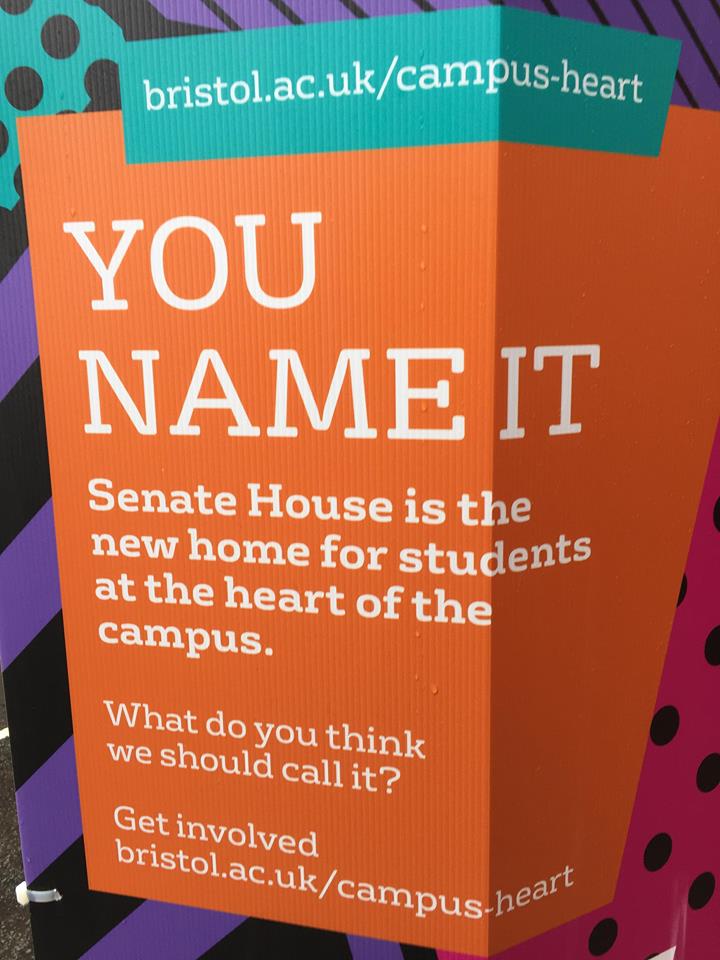Epigram is an independent and neutral newspaper, aiming to publish opinions from across the student body. To respond with an opposing opinion, please contact commentteam.epigram@gmail.com or join our Facebook writers' group.
By Michael Sheridan-Warburton, Third Year Philosophy
The renaming of Senate House is another University process that pretends to be democratic when it is anything but.
Senate House is being renamed – presumably as part of the University’s drive to make its students believe it’s opening a new nine-figure “enterprise” campus at Temple Gate because it loves education, not just corporate sponsorship and the prospect of more international students’ uncapped fees.
‘Be part of the action’, a sleek new website implores the viewer – ‘make this yours’. Paid teams of students laden with sweeties, smiles and sign-up forms have established camps in study spaces and down Tyndall Avenue. It seems a shortlist of names is to be compiled by joint enterprise between students and the University establishment, with the final name intended to be agreeable to all. If you take part in the process to rename Senate House, the website declares, you might even get a LinkedIn recommendation.
I don’t want a LinkedIn recommendation, folks. I want democracy. I want Housey McSenate.
Allow me to remind you of the way the University’s consultation processes usually work. The University sets out its plans. The University then consults stakeholders on the plans, perhaps by establishing a renaming committee (in this case) or by setting up a series of events where people can express their views on the proposed changes, such as in the hall pastoral care debacle last academic year.
Senate House is going to be your student home on campus. It's changing its name - and we want your suggestions!
— Bristol SU (@Bristol_SU) January 30, 2019
Stan Ford explains why it's important, and how you can get involved >> https://t.co/Iei7XRrIMd pic.twitter.com/02SNkggs5J
This consultation period, however, does not necessarily mean anything – don’t take it from me, take it from Caroline Court (Head of Student Residential Life), who in a leaked email last academic year expressed her surprise at Senior Residents and students who still seemed to ‘think that consultation [meant] that they [could] shape/change the proposed structure, and that consultation means debate.’
Next, the University executive usually does whatever it meant to do all along – last year, despite a student referendum declaring 92% against the proposed changes, Residential Life went ahead with their plans with only peripheral alterations. Similarly, we might rest assured that once all suggestions from the student community are in, closed-door meetings will take place to decide which names will be allowed through to the final gauntlet – all of them dry, unhumorous and apolitical – with Housey McSenate left by the wayside.
This façade of participation against a predetermined outcome is of course endemic to Western democratic systems writ large, but I’ll leave that broader point for now. What we do know, however, is that such disenfranchisement comes at a price. I believe the Brexit referendum result was a phenomenon of longstanding disenfranchisement, for example. And if we create (or have already created) the type of University environment alluded to by Ms. Court last year, where participation is ultimately performative and fundamentally pointless, we might not be surprised by low turnout in SU Elections, general campus malaise and students’ deep cynicism about possible change – because ultimately, what’s the point?

Thus, my proposal: the University executive should either cut to the chase, renaming Senate House whatever it intended to all along without going through the usual tired pseudo-democratic motions — or it should endorse a nothing-off-the-table submission-spree followed by wholly democratic primary and deciding referenda with the final result accepted without question.
Essentially, the only reasonable choice is between honest despotism and Housey McSenate.
I believe even the first case would be preferable to the current situation. At base, the University would be telling the truth and, jarred into motion, students might begin a conversation about the action required to make it listen to them once again.
The second case, however, would be positively revolutionary. Putting serious agency and trust in the student community might well result short-term in a daft name, but the potential long-term gains far outweigh the silliness.
Can't wait for my next lecture in Scholar's Keephttps://t.co/b9Z7UJwxeI
— Epigram (@EpigramPaper) February 15, 2019
Such a policy would demonstrate that student democracy is not pointless, that the University considers us as they should – as equal partners, or even majority-stakeholders – and might pave the way for further and much-needed student-led changes in every area of academic life.
Maybe we need to get Housey McSenate out of our systems. Then, we can get on with the straight-faced business of democratically transforming our University into a haven of participation where every student feels themselves a valued trustee, not just a customer.
Go on then Professor Brady, I make a pledge to you. If you let us name Senate House whatever we want, you’ll observe the effects I outline above. The Students’ Union elections this year will see their highest turnout in a long while. The University will renew its democratic mandate and score a humorous public relations coup at home and around the world. And perhaps in three or four years when we’re all too old and busy to care, you can quietly rename it to whatever you secretly favoured all along as a retirement present. Deal?
Featured image: Epigram/Ffion ClarkeWhat do you think about the renaming of Senate House? Let Epigram know!
Twitter // Epigram Comment // Facebook









